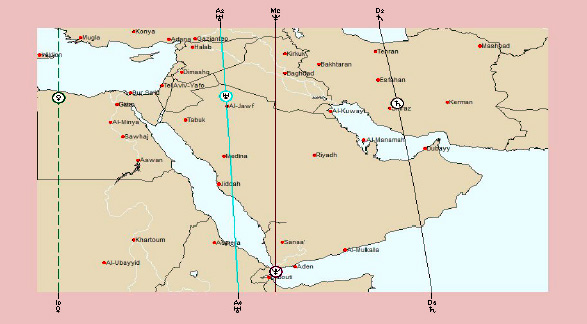February 16, 2012
“Bomb,
bomb, bomb…bomb, bomb Iran”…so went
Senator John
McCain’s spontaneous Beach Boys parody when he was running
for
president in
2008. Since then, talk
about the
possibility
of a U.S.-backed Israeli strike against possibly bomb-making Iranian
nuclear
facilities has waxed and waned without actually materializing. Right
now, the
talk is in its waxing phase again, with much saber-rattling on all
sides, the
gist of which is that if it doesn’t happen soon, it will be
too
late.
So will it
really happen this time? And if so, when and why,
astrologically?
A look at
history – both in the Middle East and in general –
tells an intriguing story. Back during Israel’s most recent
incursion into
Lebanon, we noted an interesting pattern
in Israel’s wars with her neighbors. Almost every time Israel initiates
the conflict, it is within
just a few weeks (in only one instance as much as a month and a half)
after
Mars turning direct, following its biennial several-month retrograde
period.
That applies to the Israeli war of independence in 1948, the 1956 Suez
Canal
crisis, the 1967 war, and the 1982 Lebanon incursion. Only the most
recent Lebanon
incursion was an exception – and in the case of the 1973 war
Israel didn’t
start it, its neighbors did. Either consciously or intuitively,
Israel’s
leaders tend to favor this narrow window for war. Since it’s
coming up again in
May 2012, it bears a closer look.


All of Israel's attacks right up to the 1982 Lebanon invasion(l.) fit
right into the window. So did the Persian Gulf War (r.)
Is there
anything that makes this a winning time slot to
pounce on an enemy? Classically, yes and no. The worst time to start a
war
should be with Mars, which rules war, retrograde, when it confers the
least
power upon the effort. That’s when the Arab coalition began
the
1973 war, and they
lost horribly. But, since Mars retrograde tends to instill a
debilitated state of
defense, the sooner you get moving right afterward the better, as the
enemy
hasn’t had time to make full preparations and is less likely
to
expect it
or resist it. And, since Mars starts to pick up speed rather quickly
after its
station, sooner might seem better than later.
But is it,
really? It seems so, at first glance, based on
Israel’s successes, and more impressively by those of other,
larger world powers
historically. The Nazi blitzkrieg invasion of Poland in September of
1939 was
launched right in that window, and it rolled over its hapless victim in
less
than five weeks. At the very next window in late 1941, Japan attacked
Pearl
Harbor and other American and British bases in Southeast Asia, easily
subjugating its unwary victims, who took years to recover. The window
after
that in January 1944 saw the impressive surprise Allied invasion at
Anzio. Later
in the twentieth century, the
January 1991 First Gulf War "Desert Storm" attack on Iraq was launched
by America
again in that same narrow window, with spectacular success, crushing
all
resistance in only a few days.

 Nazi invasion of Poland
(l.) and attack on
Pearl Harbor (r.) took place right in just-post-Mars-retro sky slot.
Nazi invasion of Poland
(l.) and attack on
Pearl Harbor (r.) took place right in just-post-Mars-retro sky slot.
What’s
notable about all of these apparently-spectacular
successes, however, is that in the end they were not permanently
successful
at all.
Germany ultimately lost, and so did Japan, and Anzio turned into a
slogfest
that ultimately disappointed, shifting the war emphasis to more
northern
efforts with D-Day. Later, America had to go back and fight yet another
war in
Iraq to achieve what the first one was hoped to do. And,
Israel’s
temporary
successes have all been limited in scope, while the country remains in
an
ongoing conflict with its neighbors, with the possibility of yet
another strike
in the wings. So perhaps this window is less ideal than it seems.
Although it
seems to favor the element of surprise, it doesn’t have the
staying power that
might be desired, possibly because Mars is still moving too slowly to
have
sufficient temporal effect down the line.
No doubt
that is an important consideration for astrologers
advising the generals commanding future armies. Despite misleading
rumors,
there were no such real consultations by any of the aforementioned
combatants,
so these decisions must have been determined by the innate sense of
judgment
and timing experienced military commanders feel inside, though perhaps
unknowingly
influenced by planetary cycles like the rest of the world. But the more
immediate questions arises: what about the coming window in late April
or early to mid-May, the several week period following Mars turning
direct on April 14?

The
May 20/21 solar
eclipse features Uranus, Pluto, and Saturn on the angles over the
Middle East.
To address
that, a quick look at Israel’s
chart (pretty reliable), along
with Iran’s (which are a
bit iffy) would be in order. There we see Jupiter rolling in on top of
Israel’s
Sun, a sign of confidence and ambition, along with Saturn transiting
its
Ascendant, happening several times. The two charts commonly used for
revolutionary Iran (Khomeini’s arrival,
and his subsequent declaration of a
republic)
see the transit of Uranus on Moon and Ascendent on
one and on the
Sun of the other. All of that looks like a lot of pressure for strong
and
perhaps rash and debilitating action right inside that window.
Well,
that’s a very general window of a few weeks – want
to
tighten
it down to a few days? Most attacks that involve long-range air strikes
under cover
of darkness are usually done around the dark of the Moon because, well,
it’s
darker then, harder to spot incoming planes and missiles. That would
put it on
or around the solar eclipse of May 20 in
which
Uranus is rising, Pluto on
the MC, and Saturn setting as seen from
the Middle East (see above). Sounds
brutal. If
it happens too soon, while Mars is still retro (like the 1973 war),
expect
disaster. And
if it happens on time,
like the others it will likely be a resounding success at first, but
ultimately
not accomplish what was desired. If it happens much later, when Mars is
truly
up to speed, it might actually work.
Of course,
it could all blow over and nothing will happen at
all, as it has been with the majority of cases of this biennial window
for war. But if you’re handicapping the next conflict,
now you’ve got our best bet...


